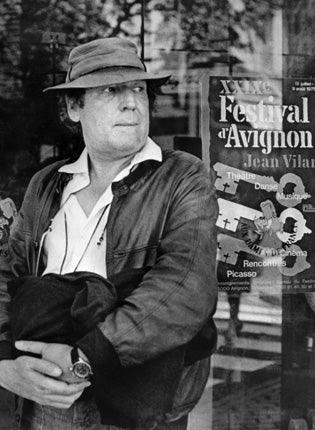Georges Wilson: Actor who played Captain Haddock and worked with Oliver Reed

Your support helps us to tell the story
From reproductive rights to climate change to Big Tech, The Independent is on the ground when the story is developing. Whether it's investigating the financials of Elon Musk's pro-Trump PAC or producing our latest documentary, 'The A Word', which shines a light on the American women fighting for reproductive rights, we know how important it is to parse out the facts from the messaging.
At such a critical moment in US history, we need reporters on the ground. Your donation allows us to keep sending journalists to speak to both sides of the story.
The Independent is trusted by Americans across the entire political spectrum. And unlike many other quality news outlets, we choose not to lock Americans out of our reporting and analysis with paywalls. We believe quality journalism should be available to everyone, paid for by those who can afford it.
Your support makes all the difference.In a career lasting over six decades, the versatile French actor Georges Wilson successfully combined stage, film and television work, yet earned most of his accolades – four Molière awards – for his theatre appearances. He followed in the footsteps of the actor Jean Vilar, who championed "an elitist theatre for everyone" and directed Wilson in Shakespeare, Molière, Corneille and Beaumarchais at the Avignon Festival. Like his mentor, Wilson eventually ran France's forward-thinking Théâtre National Populaire, and also turned to directing in the 1960s and 1970s, adding French adaptations of plays by John Osborne, Edward Bond, Charles Dyer and Tom Stoppard to the company's rEpertoire. "Finding new writers was my mission," he said. "Throughout my whole career, I looked high and low to try and find the poets writing about the world around them."
But Wilson was also a regular on the small and the big screens, and transformed himself into a remarkable Captain Haddock for the live action film Tintin Et Le Mystère De La Toison D'Or (Tintin And The Golden Fleece, 1961), which was based on an original script rather than one of Hergé's books, and released internationally. Wilson also acted alongside Marcello Mastroianni in Lo Straniero (The Stranger, 1967) – Luchino Visconti's film adaptation of the Albert Camus novel – though he may be best known to British cinema-goers and TV viewers for his cameo in the Second World War blockbuster The Longest Day (1962), or for his portrayal of Monsieur de Tréville in Richard Lester's film of The Three Musketeers (1973), which also starred Michael York, Oliver Reed, Faye Dunaway, Raquel Welch and Charlton Heston.
Born in Champigny-sur-Marne in 1921, he took up the Irish name of his maternal grandparents. He was brought up by his mother and aunt, and eventually discovered that a married man known to him as "Uncle Henri" had fathered not only him but also his aunt's daughter, thus making his cousin his half-sister.
By 1936, he was working as a junior office clerk and becoming obsessed with the theatre. He joined up and narrowly escaped being shot by the Germans and, after the war, became an habitué of the Comédie-Française, He acted in amateur productions and was spotted by Pierre Renoir, the son of the painter, who brought him to the Ecole D'Art Dramatique. Wilson soon joined a provincial tour of Sartre's Les Mains Sales (Dirty Hands) for which he combined acting with stage-management, and then spent time at the Compagnie Grenier-Hussenot in Paris and at the Centre Dramatique de L'Ouest in Rennes.
"Vilar gave me my big break," Wilson recalled of his arrival at the TNP in 1952, where he more than held his own opposite such illustrious figures as Gérard Philipe and Maria Casarès. "I found my religion. Following him was like entering a convent."
He excelled in some of the larger- than-life theatrical roles – Danton, Lear, Othello, Ubu – but was also capable of delivering more nuanced performances. In 1978, he became artistic director of the Théâtre de l'Oeuvre in Paris, and then played a major part in establishing the Salle Gémier, the experimental venue within the Théâtre National de Chaillot. Wilson believed that "directing is like conducting a symphony or a concerto. You have to find the music of each actor and then bring them all together to create harmony."
With his strong "gothic" nose and impressive height, Wilson did not look like a matinée idol but nevertheless appeared in over 80 films and 40 television productions. In 1961, he portrayed a down and out suffering from memory loss rescued by Alida Valli who believes he is her long lost husband in Henri Conti's Une Aussi Longue Absence (The Long Absence) which shared the Palme D'Or for Best Film with Luis Bunuel's Viridiana.
Mostly, he was a supreme character actor, whether playing a police superintendent in Claude Sautet's crime drama Max Et Les Ferrailleurs (1971), a headmaster in Claude Pinoteau's La Gifle (1974), and most recently a kidnapped millionaire in Mesrine: Public Enemy No 1, about the infamous French gangster. In 1989, he directed his son Lambert Wilson in La Vouivre, a film based on the Marcel Aymé novel.
Georges Wilson was still treading the boards last October, movingly portraying an old actor reminiscing in the Thomas Bernhard two-hander Simplement compliqué at the Bouffes du Nord in Paris. "It is a deeply unsettling experience," he admitted at the time. "Even as a child, I was the hypersensitive type and I found that again in Bernhard's play. My character is indomitable, always up for a fight."
Pierre Perrone
Georges Wilson, actor, director: born Champigny-sur-Marne 16 October 1921; married Nicole (deceased; two sons); died Paris 3 February 2010.
Join our commenting forum
Join thought-provoking conversations, follow other Independent readers and see their replies
Comments